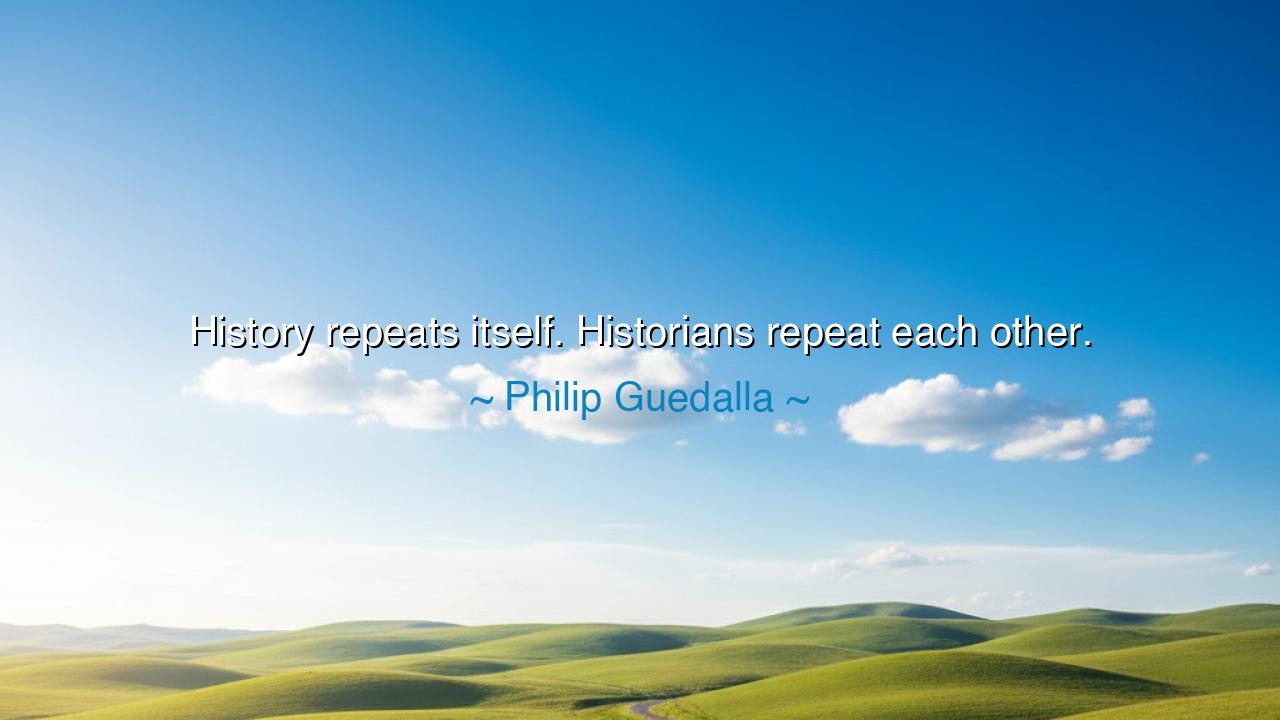
History repeats itself. Historians repeat each other.






“History repeats itself. Historians repeat each other.” – Philip Guedalla
Thus spoke Philip Guedalla, the English biographer and wit of the early twentieth century, whose sharp tongue and keen intellect pierced through the pretenses of both politics and scholarship. In this single sentence — half jest, half judgment — he exposes a truth that runs deep through the ages: that history, though it changes in costume, often dances to the same rhythm, and that those who chronicle it are too often trapped in echo rather than revelation. His words are not merely a joke at the expense of scholars; they are a mirror held to the human condition itself — for we are all both actors in the repetition of history and narrators who fail to see beyond our inherited tales.
When Guedalla says “History repeats itself,” he calls to mind the ancient pattern of human folly. Kingdoms rise and fall, tyrants conquer and collapse, generations swear they are wiser than their fathers, and yet the same errors bloom anew under different names. The ancient Greeks saw this truth and called it anankē — the necessity that binds human fate to its own mistakes. The philosophers of the East taught likewise: that until understanding blossoms, the wheel of existence turns again and again. And so it is with nations. The wars of empire, the greed of rulers, the blindness of the proud — these are not new chapters, but familiar verses in a poem written by human nature itself.
But when Guedalla adds, “Historians repeat each other,” he turns his gaze from the actors of history to the tellers of its story. Here lies his wit, and his warning. Too often, he suggests, those who claim to interpret the past do so not with courage but with conformity. They repeat what has been said before, rearranging the words but not the wisdom. They quote old authorities as though truth were fossilized in the dust of earlier pens. Thus, history becomes not a living flame but an inherited lamp — its light dimmed by the fear of original thought. Guedalla reminds us that to truly understand the past, one must look with fresh eyes, unafraid to challenge the traditions of interpretation.
Consider the tale of Christopher Columbus, long hailed as a hero who “discovered” a new world. For centuries, historians repeated this triumphal narrative, celebrating conquest while silencing the suffering it brought. Only in later generations did courageous scholars peel away the layers of myth to reveal the deeper truth: that discovery was also destruction, that progress and pain often walk hand in hand. This evolution in understanding proves Guedalla’s point — that history itself may not change, but its telling can. Yet, to change it, the historian must dare to break the cycle of repetition and see beyond the comfortable illusions of the past.
Guedalla’s humor conceals a profound challenge: if we do not question what we inherit, we become mere echoes in the corridors of time. The world today teems with repetition — of mistakes, of opinions, of narratives long unexamined. Governments make the same errors in the name of security; societies glorify the same idols under new banners; thinkers quote without reflection. To escape this cycle requires courage — the courage to think freely, to observe deeply, and to speak truths that may unsettle. Just as history repeats through the blindness of action, it repeats through the laziness of thought.
Yet, there is hope in Guedalla’s jest. For if we recognize that both history and historians repeat, then we can begin to break the pattern. Every generation has the chance to write anew — not merely to retell the stories of kings and wars, but to uncover the hidden voices, the silent struggles, the untold wisdom that older historians ignored. In doing so, we transform repetition into renewal. The past does not have to imprison us; it can teach us how to evolve beyond it.
So take this lesson to heart, seeker of truth: do not merely repeat, but reflect. Study the past not to mimic it, but to master it. Question even the most accepted tales, for truth is a living thing, not a relic to be worshiped. Let Guedalla’s wit remind you that history, if left unchallenged, will replay its tragedies, and that wisdom, if left unexamined, will turn to dust. Be both the student and the reformer of history — one who listens to its rhymes but dares to write a new verse. For though history may repeat, the wise soul learns to sing beyond its refrain.






AAdministratorAdministrator
Welcome, honored guests. Please leave a comment, we will respond soon